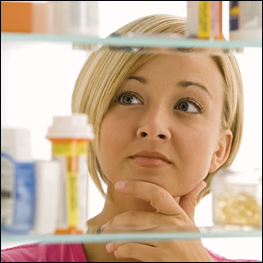
As a parent, you are an expert at scaring away the monsters under the bed or vaporizing the boogieman in the bedroom closet, but have you banished the dangers in your seemingly benign medicine cabinet? Beyond the obvious advice that all medicine should be stored securely out of reach of children, here are some potential dangers you may not have considered.
1. Do not locate the medicine cabinet in the bathroom. The humidity and heat from showers and baths can alter the composition of medications so that you do not receive the intended effect.
2. Just say no to Aspirin for children and teens due to its link to Reyes Syndrome, a rare disease that can affect the brain and liver following a viral illness. Use Acetaminophen (Tylenol) or Ibuprofen (Advil and Motrin). Both these classes of drugs offer pain and fever relief but Ibuprofen also offers anti-inflammatory benefits. Discuss with your pharmacist which pain reliever suits your child’s situation.
3. Over the counter (OTC) pain killers are real medicine. Never give adult strength medicine to children. Carefully read instructions for dosing and timing. Note the times you administer medicine so you do not overdose in error. According to Dean Mercer, a pharmacist, “OTCs can increase blood pressure, pose cardiac risk, worsen asthma and complicate infections.” So use them as directed and if you have any questions, seek professional advice.
4. Use cold and cough medicines cautiously. They are not recommended for children under six because research has shown that they are of limited value and pose serious risks. Mercer suggests that saline drops and spray can offer relief from cold symptoms and honey lozenges can ease the throats of children over one year of age. Children over 12 can be given adult strength but always read the instructions on the medicine container.
5. Small errors can have a large impact on small bodies. Follow the dosage for prescribed and over the counter medicines. Children have been seriously harmed or killed by an overdose. Mercer recommends a syringe with measured lines, not kitchen spoons. Have the pharmacist show you how to measure the dosage if you are unsure. Record your child’s weight regularly so you are not guessing when you are drawing up medicine in the middle of the night with a sleepy brain.
6. Even items like mouthwash can be dangerous to children if ingested in large doses. Razors are a hazard in small hands and aerosols can be toxic if inhaled, so also keep beauty products out of reach.
7. Do not let your medicine cabinet fuel a “pharm party”. This is a practice where teens put prescription medicines and OTC drugs from the household medicine cabinet into a big bowl and grab handfuls of pills without knowing what they are taking. Talk to your teens about the dangers of this potentially lethal behavior.
8. Start conversations about proper use of medicine with children when they are young. Do not suggest that medicine “tastes like candy.” Model taking your own medication appropriately. Do not take medicine prescribed for someone else or self-diagnose and take medicine left over from a previous illness.
9. Discard expired or leftover medications.
Sue is a mom with two children. She has drawn up her fair share of medicine over the years, always in syringes, never in kitchen spoons.
Calgary’s Child Magazine © 2024 Calgary’s Child